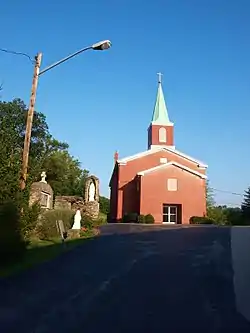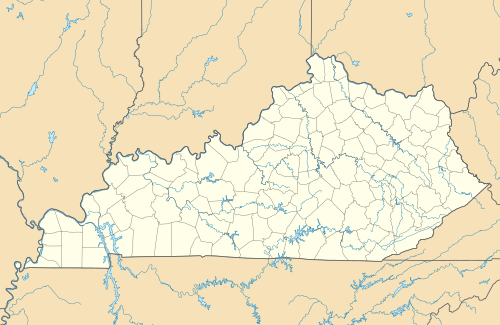St. Joseph Catholic Church (Camp Springs, Kentucky)
St. Joseph's Catholic Church, also known as St. Joseph, Camp Springs and St. Joseph in the Hills, is a rural Roman Catholic parish in Camp Springs in Campbell County, Kentucky. The historic parish church and cemetery are located at 6833 Four Mile Road. The parochial school was located on the adjacent plot at 6829 Four Mile Road. It remains an active parish in the Roman Catholic Diocese of Covington, and its cemetery is still open for the burial of parish members.[1][2][3][4][5]
St. Joseph's Catholic Church and Cemetery | |
 | |
  | |
| Nearest city | 6833 Four Mile Road, Camp Springs, Kentucky, near Alexandria, Kentucky |
|---|---|
| Coordinates | 38°59′38″N 84°21′42″W |
| Area | 4.5 acres (1.8 ha) |
| Built | 1864 |
| MPS | German Settlement, Four Mile Creek Area TR |
| NRHP reference No. | 83002618[1] |
| Added to NRHP | May 16, 1983 |
History
Catholic priests had visited the area as early as 1844. Martin Spalding, Bishop of Louisville, himself came to Four Mile Creek in August 1853 and was instrumental in the founding of the parish.[6] By 1858, there were 109 registered families, mostly German immigrants.[6] In 1868, the parish school moved into its own stone building, though this was later replaced with a modern structure, and by 2015, the school had closed except for its preschool programs due to declining enrollment.
Church
The church is situated on a promontory that overlooks the valley. Completed in 1865, it is a belfried brick structure with a low gabled roof. It is notable for the rich iconography of its interior decor, including altarpieces and murals, mostly installed under the pastorship of Fr. Woestehen, parish priest from 1909 to 1926. Stained glass windows were contributed by members of the church from 1910 to 1912, and plaster and molding work were also installed in 1912. In the 1920s, the church's murals were painted by Leon Lippert, a student of noted Covington artist Frank Duveneck.[6] The statue of Our Lady of Sorrows was donated in 1926 by Emma Ritter, and marble work in the sanctuary was completed by Bert Moriconi and painted in the 1940s.[6]
On May 16, 1983, the church and cemetery were added to the National Register of Historic Places.
References
- "National Register Information System". National Register of Historic Places. National Park Service. March 13, 2009.
- St Joseph Cemetery
- Diocese of Covington directory
- NRHP Nominating Form
- Photos attached to NRHP Nominating Form
- Torma, Carolyn M. and Chappell, Edward A. (May 10, 1979), Kentucky Historic Resources Inventory: St. Joseph's Catholic Church and Cemetery, Campbell County Heritage LeagueCS1 maint: uses authors parameter (link)
External links
- Official parish site
- St. Joseph Camp Springs Pre-Kindergarten
- St. Joseph Catholic Cemetery at Find A Grave